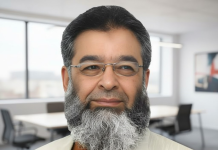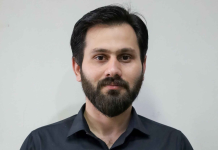Qamar Bashir
In a pivotal diplomatic move, the Organization of Islamic Cooperation (OIC) and the Arab League initially were scheduled to hold separate sessions, but the gravity of the situation prompted a joint gathering hosted by Crown Prince Mohammad Bin Salman of Saudi Arabia. This unified front aimed to showcase solidarity on a pressing issue: punitive actions against Israel.
The collective anticipation of the entire Muslim Ummah rested on the hope for a unified stance against Israel’s egregious actions. The expectation was for a resolute declaration labeling Israel as a terrorist state, holding it accountable for the ruthless and cold-blooded killing of over 11,000 civilians, perpetrated with total impunity. The desire extended to leveraging oil as a powerful weapon, intended to compel the United States and its ally Israel to yield, humbled at the feet of justice.
The fervent aspiration included a call to deny airspace to Israel and its allies across Muslim nations and among those who champion humanitarian values. It sought to cut off all air, land, and sea routes to Israel, implementing a comprehensive boycott of Israeli products and those supporting its cause. The call further resonated with the imperative of severing diplomatic ties with Israel and its supporters, deploying all available tools and pressures to enforce a two-state solution. This envisioned solution aimed to grant Palestinians the freedom to live in accordance with their religious beliefs, customs, and social values, free from any form of intimidation, coercion, or humiliation.
However, the conference’s impact was diminished by evident divisions among member countries, stemming from concerns about potential repercussions from the United States. The fear of facing the wrath of the USA led to a visible hesitancy among nations, tempering their collective stance against Israel.
Within this divide, opinions diverged on the status of Hamas. While some countries voiced support, viewing it as a legitimate entity spearheading the Palestinian struggle, others, considering it an extension of Iran’s influence, hesitated to endorse its legitimacy. This internal discord weakened the OIC and Arab League’s joint message, hindering the efficacy of their collective diplomatic efforts.
Regrettably, the joint meeting faced dismissive reactions from both Israel and the United States. Instead of heeding its call for restraint, the relentless attacks on innocent civilians escalated. Hospitals, ambulances, and mosques bore the brunt of the aggression, emphasizing the dire humanitarian consequences of the conflict.
Regrettably, the desired unity and resolute action faced stark challenges on the international stage. While the aspirations were noble and the expectations high, the reality reflected the intricate geopolitical complexities and the formidable obstacles posed by global power dynamics. The gap between hope and reality serves as a poignant reminder of the profound challenges in achieving a unified response against the injustices faced by the Palestinian people.
As anticipated, the joint statement fell short of endorsing the comprehensive measures sought by many, culminating instead in a declaration of relatively toothless actions. These included an appeal for immediate ceasefire, a halt to the forced exodus of Palestinians to Egypt or other locations, the establishment of open corridors for the delivery of essential humanitarian aid, and an appeal to the United Nations Security Council for the passage of a binding resolution on Israel knowing that this would once again will be vetoed by USA.
The primary objective of this resolution was to call upon Israel to cease its ongoing killing spree and the alarming acts of genocide against innocent women, children, and civilians—actions that have brazenly surpassed all recognized redlines.
In the process of normalizing relations with Arab states, Iran’s presence in the meeting signaled a noteworthy rapprochement towards the Arab world. Acknowledging its delicate position within the predominantly Arab conference, the Iranian President strategically praised Hamas, the leading resistance movement against Zionist forces in the ongoing 35-day war.
Emphasizing that the Palestinian issue transcends simple human rights concerns, the Iranian President framed it as a matter of human dignity. He condemned the Zionist regime of Israel, alleging that it, with the support of the USA and the West, has consistently denied the Palestinian people their fundamental dignity.
The Iranian President underscores the urgency of meaningful, result-oriented, and time-bound dialogues among Muslim countries to enforce a two-state solution for the Palestine issue. While echoing the call for a ceasefire and the restoration of humanitarian aid corridors, he vehemently opposes allowing the Zionist regime to continue its killing spree with impunity. In contrast to other nations, Iran openly supports and admires the Palestinian resistance movement led by Hamas.
The President warns that if Israel, backed by the USA, persists in killing innocent civilians, the conflict could escalate to engulf other regions like Lebanon, Yemen, Iraq and Syria.
He calls for a unified Muslim voice to compel Israel to leave Gaza and restore the dignity and honor of Palestinians. Advocating for impactful measures, he urges the use of oil as a tool to humble Israel, the USA, and their supporters.
The President calls for the severance of diplomatic relations with Israel, declaring it a terrorist country with a terrorist regime. Additionally, he advocates for a global boycott of Israeli products as a means to exert collective pressure on the nation.
In his impassioned address, the Iranian President stressed that the lasting solution to the Palestinian issue lies in restoring the rightful ownership of the land to the Palestinians, which has been denied for 70 long years through the construction of Zionist settlements.
The Turkish President, Erdogan Tayyip, delivered a carefully crafted speech, urging the holding of an international conference for a lasting solution based on a two-state framework.
He proposed the establishment of an international fund for the reconstruction of Gaza and the rehabilitation of those physically and psychologically affected by the conflict. Erdogan also advocated taking Israel to the International Court of Justice for alleged war crimes.
In a brief yet carefully worded address, the Qatari representative called for the release of captives by both Hamas and Israel. He condemned the displacement of Palestinians from North to South and towards Egypt.
The leaders, in their respective addresses, largely focused on condemning the indiscriminate killing of civilians and urging the restoration of humanitarian aid.
They characterized Israel’s retaliation for the events of 9 October as inhumane and unacceptable, expressing dismay at the international community’s silence in the face of Israel’s brutality.
The leaders criticized the paradox of the West claiming to champion human rights while simultaneously vetoing a UNSC resolution calling for the cessation of Israeli bombardment.
They underscored the necessity of forcing Israel to compensate for the lives lost and the destruction inflicted upon Gaza and urging Muslim countries to utilize every available tool to achieve a lasting solution to the Palestine conflict.
As anticipated, Mr. Osama Hamdan, a spokesperson of Hamas in an interview while reflecting on the outcome of the OIC-Arab League joint sitting, deemed the results as falling short and arriving too late.
He emphasized that the ongoing Israeli assault on Gaza, now in its 35th day of relentless and unceasing bombing equivalent to seven nuclear bombs, blatantly violates international laws and human rights.
Hamdan called for an immediate halt to the attacks and the swift restoration of supplies for fuel, electricity, water, and food to address the dire humanitarian situation.
Mr. Hamdan urged Muslim countries to isolate Israel and stressed the need for concrete actions to pave the way for the establishment of an independent and sovereign state of Palestine. The urgency of these measures, he emphasized, is paramount in light of the ongoing crisis and the escalating human toll in Gaza.
The Arab and Muslim countries are confronted with a looming dilemma, caught in a complex web of dependence on the USA and the West for their security needs. Many have granted bases to the USA, facilitating the maintenance of its formidable war machine within their borders. However, the stark reality is that none of these nations possess the economic, financial, or military strength to pose a credible threat to the USA, the West, or Israel.
The strategic use of oil as a weapon in the 1970s, which once had a significant impact, has now become toothless. Lessons learned from the past have led Western countries to minimize their reliance on oil imports, either through developing alternative energy sources or innovative means of energy generation.
Even when combined, all Muslim countries collectively lack the capacity to rival Israel’s economic, financial, technological, and innovative prowess. Attempting to sever diplomatic ties or downgrade economic relations poses a considerable risk, as it could adversely impact the economic and financial well-being of these countries both collectively and individually.
The harsh reality is that none of these nations is prepared to face a potential counter offensive launched by the USA and the West. Their dependencies on satellite systems, global internet infrastructure, reliance on exports to developed nations, and their ties to international financial institutions largely funded by the USA, the West, and Israel leave them vulnerable and comparatively powerless.
In this precarious scenario, the toothless declaration of the OIC-Arab League is somewhat encouraging, signifying a collective understanding of the limitations and potential repercussions of more assertive measures. It reflects a pragmatic acknowledgment of the existing power dynamics and the challenges faced by these nations in navigating a delicate geopolitical landscape.
Qamar Bashir
Press Secretary to the President(Rtd)
Former Press Minister at Embassy of Pakistan to France
Former MD, SRBC

















